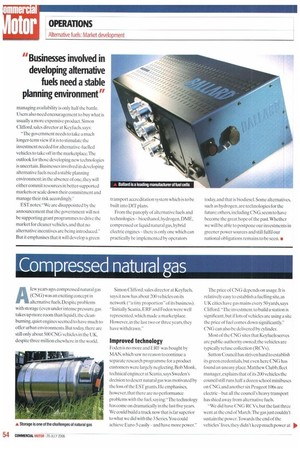Compressed natural gas
Page 54

If you've noticed an error in this article please click here to report it so we can fix it.
Afew years ago, compressed natural gas (CNG) was an exciting concept in alternative fuels. Despite problems with storage (even under intense pressure, gas takes up more room than liquid), the cleanburning, quiet engines seemed to have much to offer urban environments. But today, there are still only about 500 CNG vehicles in the UK, despite three million elsewhere in the world. Simon Clifford,sales director at Keyfuels, says it now has about 200 vehicles on its network (-a tiny proportion" of its business). "Initially Scania,ERF and Foden were well represented, which made a marketplace. However, in the last two or three years, they have withdrawn."
Improved technology Foden is no more and ERF was bought by MAN, which saw no reason to continue a separate research programme fora product customers were largely neglecting. Bob Monk, technical engineer at Scania, says Sweden's decision to desert natural gas was motivated by the loss of the EST grants. He emphasises, however, that there are no performance problems with the fuel,sayinrThe technology has come on dramatically in the last five years. We could build a truck now that is far superior to what we did with the 3 Series, You could achieve Euro-5 easily and have more power." The price of CNG depends on usage. it is relatively easy to establish a fuelling site, as UK cities have gas mains every 50 yards, says Clifford ."The investment to build a station is significant, but if lots of vehicles are using a site the price of fuel comes down significantly." CNG can also be delivered by cylinder.
Most of the CNG sites that Keyfuels serves are public-authority owned; the vehicles are typically refuse collection (RCVs).
Sutton Council has striven hard to establish its green credentials, but even here CNG has found an uneasy place. Matthew Clubb, fleet manager, explains that of its 200 vehicles the council still runs half a dozen school minibuses on CNG, and another six Peugeot 106s are electric but all the council's heavy transport has shied away from alternative fuels.
"We did have CNG RC:Vs, but the last three went at the end of March.The gas just couldn't sustain the power.Towards the end of the vehicles' lives, they didn't keep much power at 1110
























































































































































































